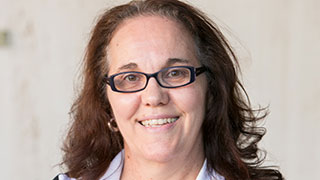7 Questions with a Nonprofit Expert - Seton Hall University
Friday, April 3, 2020

Roseanne Mirabella
As the world navigates the uncertain conditions surrounding COVID-19, nonprofit organizations will work to address evolving public needs and support communities directly impacted by the virus. Roseanne Mirabella, a professor in the Department of Political Science and Public Affairs at Seton Hall University, has conducted extensive research on nonprofit management and philanthropy. She recently addressed the significant role of the nonprofit sector and how it can adjust to meet the needs of its stakeholders during this time.
1. The federal government has made assurances that it will provide financial support for businesses. Do you see the government playing a role in securing the future of nonprofit organizations?
According to the National Council of Nonprofits, nonprofits are also eligible for financial support. They will be eligible to apply for some of the funding through the Coronavirus Aid, Relief, and Economic Security Act CARES Act (Pub. L. 116 – 132). Included are program loans for paychecks for nonprofits with fewer than 500 employees, economic disaster loans, increased incentives for charitable giving, payroll tax credits for eligible nonprofits, and additional provisions for specific nonprofits such as health care or educational institutions. That is the good news. The questions are these. How much money is allocated in the bill and how will funds be allocated? With three million people out of work and business grinding to a halt, which organizations will get priority in a time of limited resources?
I would answer the second part of your question in this way. Since the 1980s and the advent of neoliberal approaches to governance, the federal government has stepped back from supporting social programs instead turning to the market to address these needs. As a result, we saw a "hollowing out of the state" (Rhodes, 1994) with the central government moving away from the provision of services. We refer to this in the field as the devolution of government, where the central government removes itself from the provision of services for communities, leaving it to state and local governments. Some have argued, including Alice Rivlin (1992), that state and local governments should take care of most service provision—probably with the exception of health care—with the caveat that the federal government provides the resources for services at the local level as it has the greatest ability to raise taxes. The current Republican administration is not inclined to support nonprofit organizations or quite frankly local or state government provision of services.
Over the past forty years, governments at all levels have restricted access to services and reduced government programs. Many more hoops for people to jump through. Our nation has embraced a neoliberal approach advocating that the market should provide the solution for all problems. The increased marketization of public programs and services is reflected in a shift to for-profit solutions to public issues. For the government to play a meaningful role in the delivery of services through the nonprofit sector, we would need to see a shift in values from the market to care. It is only with this shift that I would see the government playing a role in securing the future of nonprofits.
One more point. I am certain we will see more calls for social enterprises and entrepreneurial approaches to the delivery of services. This continues the neoliberal narrative with the government relinquishing its role in the provision of services to its citizens and advocating market-like solutions to public problems.
2. Should nonprofits engage in some regular activities (e.g., collecting donations) during such a far-reaching crisis?
The news over the past few weeks would suggest they can try, but they will not be successful. GoFundMe is being inundated with people asking for money for this or that cause. And it is not just nonprofits. Businesses are starting GoFundMe initiatives to fund their unemployed staff. With people worried about their health and at the same time worried about the economy and their 401(k) accounts, I don't see individual donations increasing to meet the need.The data show giving declined during the 2008 recession (Reich & Reimer, 2012), and we can expect the same today. Foundations and philanthropists have stepped forward with some giving initiatives, but these will be a drop in the bucket. The Chronicle of Philanthropy reported that giving has topped one billion dollars around the world. Of this amount, only one-hundred and eighty-two million dollars is from the U.S. with more than half coming from the Gates Foundation. Of course, we are still at the beginning of the curve in our country, but you can see how limited philanthropic giving will be to adequately address the question of nonprofit funding. This is a time where the government must step up much as Franklin Delano Roosevelt did during the Great Depression. Only the government has the resources to keep the nonprofit sector open and provide vital services for our communities.
3. Should nonprofit organizations adapt their programs and services during this period? If so, how?
Many have already done this. For example, our oldest daughter, an adult with intellectual disabilities, attends a day program at a local nonprofit. The day program is closed while the state is locked down. However, it has group homes that obviously must remain open. This is an example of programs shrinking while maintaining services that are vital during this time. I heard yesterday of a program that had an on-site meals program for seniors. Now, they are delivering meals to the seniors' homes and groceries as well. Nonprofits have always adapted to their environments, and I see them continuing to do so during this crisis.
4. In what ways do you think the nonprofit sector will respond to evolving community needs?
Whew. What a question. We don't know what the needs are going to be. Millions of people out of work, children home from school, everyone social distancing. We will certainly face a mental health crisis both during and after the pandemic. The nonprofit sector will step up to meet this need. We know that the number of domestic violence cases has already grown during this time, and I suspect the nonprofit sector will open shelters for this population. Nonprofits have always stepped in when the government has failed. We call this government failure in the field. When there is a need, communities act. And nonprofits are the preferred vehicle, the most trusted vehicle. I suspect this will continue. Nonprofits will pop up here and there to address these needs. It is happening already, albeit informally.
5. Do you think the crisis will impact the types of jobs available for upcoming graduates moving into nonprofit management?
Did I mention there are three million unemployed people as a result of the pandemic? The only organization that can solve the employment issue is the federal government. There needs to be a jobs program of a magnitude we have never seen. We need to put people back to work in our communities while addressing vital public needs as referenced above. We thought millennials had it bad. Gen Z is about to get walloped. But the federal government can change the trajectory of the employment situation if it has the will.
6. Is there any advice you would like to give graduates going out into the nonprofit sector following such an unprecedented event?
Yes. Volunteer. Pitch in virtually now and in person when the restrictions are lifted. Our students have so many skills that can be useful to the field. We have master of public administration (MPA) graduates who are well-versed in program development, project management, and addressing the needs of marginalized communities. We have undergraduates pursuing nonprofit minors who are quite aware of the needs of communities and can help nonprofits on the ground. Volunteering in the sector is one of the best ways to secure a job. Volunteering provides you with the ability to further develop your skills—while helping those in need during these extraordinary times—as well as provide access to an incredible network of nonprofit professionals who will help you in your job search.
7. Is there a question I should have asked you?
Yes! Who is going to be hit hardest by this pandemic and how can nonprofits address this? I would answer the question in two ways. First, we don't need to worry about the Ys or the Red Cross or other large nonprofits. They have lots of money and will be fine (similar to not worrying about Harvard or Yale right now!). But we do have to worry about the small mom and pop organizations that address the needs of marginalized communities. These will be the first threatened with extinction by the pandemic.
The second way to answer this question is to identify which populations will be hit hardest by the pandemic. It will be those who are marginalized, people of color, the disabled, women, the LGBTQI+ community, people living in poverty, those in the gig economy, migrants and refugees, and those people living in Southern nations of the world. We need to turn outward, not inward, during this crisis. Not just helping our neighbor across the street but helping those across the country and around the globe.
How can this be accomplished? Again, the federal government has a tremendous role to play here. Inequality will increase during the crisis. Some people will have access to health care and others will not. Though some will see a dip in their 401(k) plans, most of them will still have jobs. The uber-wealthy probably lost money in their stock portfolios, but they are uber-wealthy and will survive. We will see poverty in our nation and around the world like we have never seen it before unless we act collectively. It remains to be seen whether we will do this. Unfortunately, the federal government has pitted state against state in a bidding war for scarce resources including ventilators and personal protective equipment (PPE). We must come together as a nation and as a world if we are to come out the other end of this okay.
Roseanne Mirabella, Ph.D.
Roseanne M. Mirabella, Ph.D. is a professor in the Department of Political Science and Public Affairs and executive director of the Center for Community Research and Engagement at Seton Hall University. She conducts research on philanthropy and nonprofit management education, international education for managers of NGOs, and critical perspectives on nonprofit organization management. Mirabella recently co-edited Reframing Nonprofit Organizations: Democracy, Inclusion and Social Change, which provides students of nonprofit management with perspectives not typically included in the curriculum. She has served as president for the Association for Research on Nonprofit Organizations and Voluntary Action and the North Jersey Chapter of the American Society for Public Administration. For more than twenty years, Dr. Mirabella has assisted many local community-based organizations in planning, programming, and social change initiatives. She recently received the 2019 Academic of the Year Award from the New Jersey Chapter of the American Society for Public Administration.
Categories: Business






